-
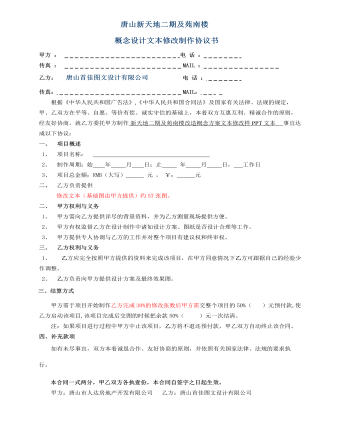
概念设计文本修改制作协议书
根据《中华人民共和国广告法》,《中华人民共和国合同法》及国家有关法律、法规的规定,甲、乙双方在平等、自愿、等价有偿、诚实守信的基础上,本着双方互惠互利、精诚合作的原则,经友好协商,就乙方委托甲方制作 新天地二期及苑南楼改造概念方案文本修改样PPT文本 事宜达成以下协议:一、 项目概述1、 项目名称: 2、 制作周期:始 年 月 日;止 年 月 日, 工作日3、 项目总金额:RMB(大写) 元 , ¥: 元二、 乙方负责提供修改文本(基础图由甲方提供)约57张图。二、 甲方权利与义务1、 甲方需向乙方提供详尽的背景资料,并为乙方测量现场提供方便。2、 甲方有权监督乙方在设计制作中诸如设计方案、图纸是否设计合理等工作。3、 甲方提供专人协调与乙方的工作并对整个项目有建议权和终审权。三、 乙方权利与义务1、 乙方应完全按照甲方提供的资料来完成该项目,在甲方同意情况下乙方可跟据自己的经验少作调整。 2、 乙方负责向甲方提供设计方案及最终效果图。
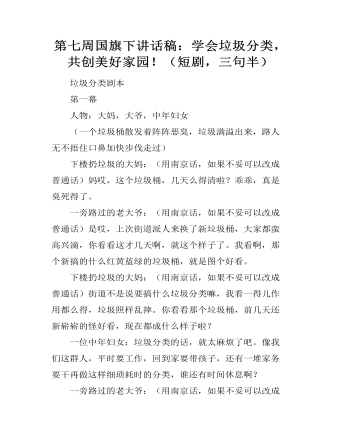
第七周国旗下讲话稿:学会垃圾分类,共创美好家园!(短剧,三句半)
垃圾分类剧本第一幕人物:大妈,大爷,中年妇女(一个垃圾桶散发着阵阵恶臭,垃圾满溢出来,路人无不捂住口鼻加快步伐走过)下楼扔垃圾的大妈:(用南京话,如果不妥可以改成普通话)妈哎,这个垃圾桶,几天么得清啦?乖乖,真是臭死得了。一旁路过的老大爷:(用南京话,如果不妥可以改成普通话)是哎,上次街道派人来换了新垃圾桶,大家都蛮高兴滴,你看看这才几天啊,就这个样子了。我看啊,那个新搞的什么红黄蓝绿的垃圾桶,就是图个好看。下楼扔垃圾的大妈:(用南京话,如果不妥可以改成普通话)街道不是说要搞什么垃圾分类嘛,我看一得儿作用都么得,垃圾照样乱摔。你看看那个垃圾桶,前几天还新崭崭的怪好看,现在都成什么样子啦?一位中年妇女:垃圾分类的话,就太麻烦了吧。像我们这群人,平时要工作,回到家要带孩子,还有一堆家务要干再做这样细琐耗时的分类,谁还有时间休息啊?一旁路过的老大爷:(用南京话,如果不妥可以改成普通话)我们老年人倒是有空,就是不知道怎么分类。再说这垃圾桶上的标志也不清楚,走远一得儿就看不见,欺负老年人视力不好还是啊?
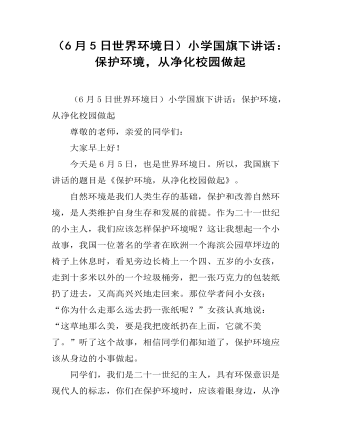
(6月5日世界环境日)小学国旗下讲话:保护环境,从净化校园做起
自然环境是我们人类生存的基础,保护和改善自然环境,是人类维护自身生存和发展的前提。作为二十一世纪的小主人,我们应该怎样保护环境呢?这让我想起一个小故事,我国一位著名的学者在欧洲一个海滨公园草坪边的椅子上休息时,看见旁边长椅上一个四、五岁的小女孩,走到十多米以外的一个垃圾桶旁,把一张巧克力的包装纸扔了进去,又高高兴兴地走回来。那位学者问小女孩:“你为什么走那么远去扔一张纸呢?”女孩认真地说:“这草地那么美,要是我把废纸扔在上面,它就不美了。”听了这个故事,相信同学们都知道了,保护环境应该从身边的小事做起。
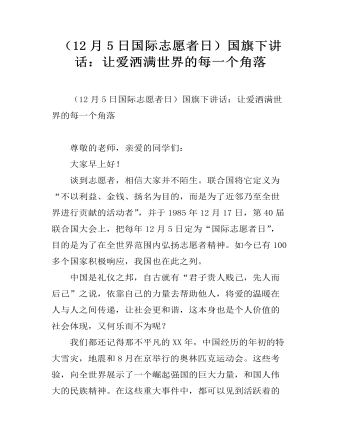
(12月5日国际志愿者日)国旗下讲话:让爱洒满世界的每一个角落
谈到志愿者,相信大家并不陌生。联合国将它定义为“不以利益、金钱、扬名为目的,而是为了近邻乃至全世界进行贡献的活动者”,并于1985年12月17日,第40届联合国大会上,把每年12月5日定为“国际志愿者日”,目的是为了在全世界范围内弘扬志愿者精神。如今已有100多个国家积极响应,我国也在此之列。中国是礼仪之邦,自古就有“君子贵人贱己,先人而后己”之说,依靠自己的力量去帮助他人,将爱的温暖在人与人之间传递,让社会更和谐,这本身也是个人价值的社会体现,又何乐而不为呢?我们都还记得那不平凡的XX年,中国经历的年初的特大雪灾,地震和8月在京举行的奥林匹克运动会。这些考验,向全世界展示了一个崛起强国的巨大力量,和国人伟大的民族精神。在这些重大事件中,都可以见到活跃着的一些身影,是的,他们是志愿者。他们奋不顾身赶赴灾区,运输救灾物质,帮助受难群众。他们不计名利,默默奉献,为人们重建家园,他们用爱心、关怀、抚慰人们受伤的心灵。他们以热情、礼貌、智慧向来自四面八方的宾朋展示中国的魅力。当我们再回想起这一幕幕场景时,怎能忘记这些可爱的志愿者们,所付出的一切呢?
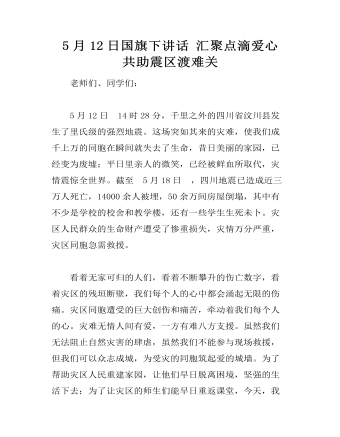
5月12日国旗下讲话汇聚点滴爱心 共助震区渡难关
5月12日 14时28分,千里之外的四川省汶川县发生了里氏级的强烈地震。这场突如其来的灾难,使我们成千上万的同胞在瞬间就失去了生命,昔日美丽的家园,已经变为废墟;平日里亲人的微笑,已经被鲜血所取代,灾情震惊全世界。截至 5月18日 ,四川地震已造成近三万人死亡,14000余人被埋,50余万间房屋倒塌,其中有不少是学校的校舍和教学楼,还有一些学生生死未卜。灾区人民群众的生命财产遭受了惨重损失,灾情万分严重,灾区同胞急需救援。看着无家可归的人们,看着不断攀升的伤亡数字,看着灾区的残垣断壁,我们每个人的心中都会涌起无限的伤痛。灾区同胞遭受的巨大创伤和痛苦,牵动着我们每个人的心。灾难无情人间有爱,一方有难八方支援。虽然我们无法阻止自然灾害的肆虐,虽然我们不能参与现场救援,但我们可以众志成城,为受灾的同胞筑起爱的城墙。为了帮助灾区人民重建家园,让他们早日脱离困境,坚强的生活下去;为了让灾区的师生们能早日重返课堂,今天,我们全体师生聚集在这里,化悲痛为力量,开展“向地震灾区同胞献爱心”活动,以捐款方式为灾区人民提供援助。
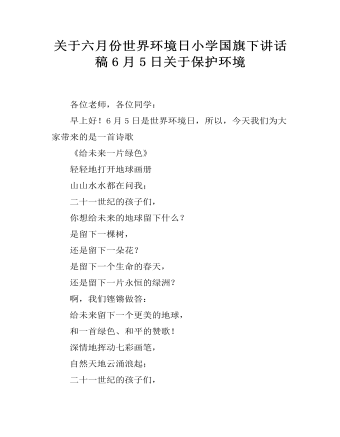
关于六月份世界环境日小学国旗下讲话稿6月5日关于保护环境
各位老师,各位同学:早上好!6月5日是世界环境日,所以,今天我们为大家带来的是一首诗歌《给未来一片绿色》轻轻地打开地球画册山山水水都在问我;二十一世纪的孩子们,你想给未来的地球留下什么?是留下一棵树,还是留下一朵花?是留下一个生命的春天,还是留下一片永恒的绿洲?啊,我们铿锵做答:给未来留下一个更美的地球,和一首绿色、和平的赞歌!深情地挥动七彩画笔,自然天地云涌浪起;二十一世纪的孩子们,
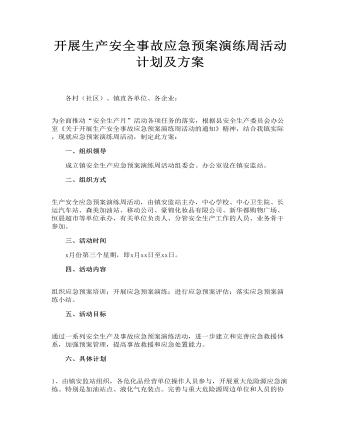
开展生产安全事故应急预案演练周活动计划及方案
二、组织方式 生产安全应急预案演练周活动,由镇安监站主办,中心学校、中心卫生院、长运汽车站、森美加油站、移动公司、豪锦化妆品有限公司、新华都购物广场、恒晨超市等单位承办,有关单位负责人、分管安全生产工作的人员、业务骨干参加。 三、活动时间 x月份第三个星期,即x月xx日至xx日。 四、活动内容 组织应急预案培训;开展应急预案演练;进行应急预案评估;落实应急预案演练小结。
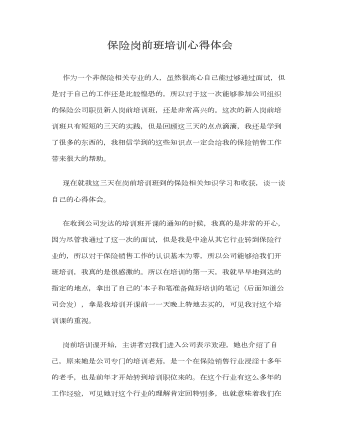
保险岗前班培训心得体会
在收到公司发达的培训班开课的通知的时候,我真的是非常的开心,因为尽管我通过了这一次的面试,但是我是中途从其它行业转到保险行业的,所以对于保险销售工作的认识基本为零,所以公司能够给我们开班培训,我真的是很感激的。所以在培训的第一天,我就早早地到达的指定的地点,拿出了自己的`本子和笔准备做好培训的笔记(后面知道公司会发),拿是我培训开课前一一天晚上特地去买的,可见我对这个培训课的重视。
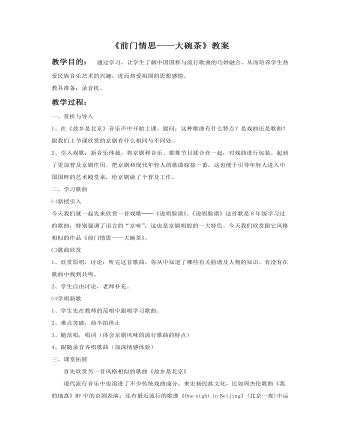
《前门情思大碗茶》教案
一、赏析与导入1、在《故乡是北京》音乐声中开始上课。提问:这种歌曲有什么特点?是戏曲还是歌曲?跟我们上节课欣赏的京剧有什么相同与不同处。2、引入戏歌:新音乐体裁。将京剧和音乐、歌舞节目揉合在一起,对戏曲进行包装。起到了更加普及京剧作用。把京剧和现代年轻人的歌曲嫁接一番,这也便于引导年轻人进入中国国粹的艺术殿堂来,给京剧做了个普及工作。二、学习歌曲㈠新授引入今天我们就一起先来欣赏一首戏歌──《说唱脸谱》。《说唱脸谱》这首歌是8年级学习过的歌曲,特别强调了语言的“京味”,这也是京剧唱腔的一大特色。今天我们欣赏跟它风格相似的作品《前门情思——大碗茶》。
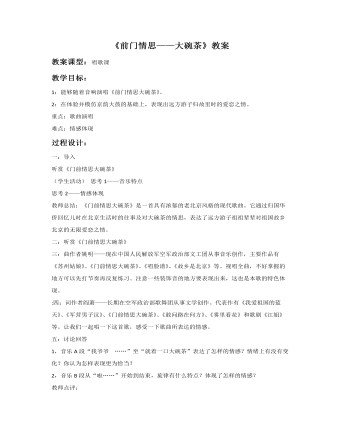
《前门情思大碗茶》教案
一:导入听赏《门前情思大碗茶》(学生活动) 思考1——音乐特点思考2——情感体现教师总结:《门前情思大碗茶》是一首具有浓郁的老北京风格的现代歌曲。它通过归国华侨回忆儿时在北京生活时的往事及对大碗茶的情思,表达了远方游子祖祖辈辈对祖国故乡北京的无限爱恋之情。二:听赏《门前情思大碗茶》三:曲作者姚明——现在中国人民解放军空军政治部文工团从事音乐创作,主要作品有《苏州姑娘》、《门前情思大碗茶》、《唱脸谱》、《故乡是北京》等。视唱全曲,不好掌握的地方可以先打节奏再反复练习。注意一些装饰音的地方要表现出来,这也是本歌的特色体现。四:词作者阎萧——长期在空军政治部歌舞团从事文学创作。代表作有《我爱祖国的蓝天》、《军营男子汉》、《门前情思大碗茶》、《敢问路在何方》、《雾里看花》和歌剧《江姐》等。让我们一起唱一下这首歌,感受一下歌曲所表达的情感。
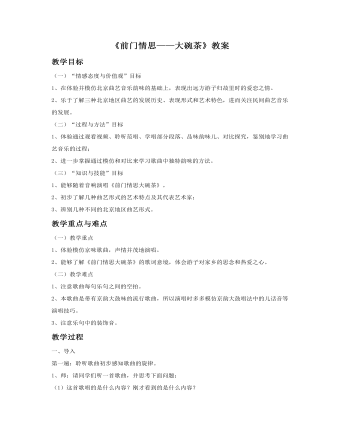
《前门情思——大碗茶》教案
教学目标(一)“情感态度与价值观”目标1、在体验并模仿北京曲艺音乐韵味的基础上,表现出远方游子归故里时的爱恋之情。2、乐于了解三种北京地区曲艺的发展历史、表现形式和艺术特色,进而关注民间曲艺音乐的发展。(二)“过程与方法”目标1、体验通过观看视频、聆听范唱、学唱部分段落、品味韵味儿、对比探究,鉴别地学习曲艺音乐的过程;2、进一步掌握通过模仿和对比来学习歌曲中独特韵味的方法。(三)“知识与技能”目标1、能够随着音响演唱《前门情思大碗茶》。2、初步了解几种曲艺形式的艺术特点及其代表艺术家;3、辨别几种不同的北京地区曲艺形式。
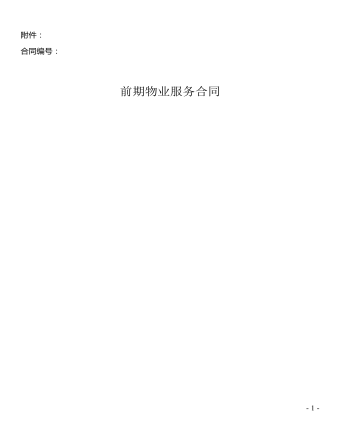
前期物业服务合同
第一条 本物业项目(以下简称“本物业”)基本情况物业名称: 物业类型:□多层住宅 □高层住宅 □独立式住宅 □办公楼□厂房 □其他 座落位置: 市 区/县 乡/镇 路 号四至范围(物业规划总平面图)占地面积: 平方米总建筑面积: 平方米 其中:多层住宅面积 平方米高层住宅面积 平方米独立式住宅(别墅)面积 平方米其他 平方米(物业规划总平面图见附件一,物业构成细目见附件二)。第二条 物业服务用房物业服务用房建筑面积为 平方米,其中业主大会及业主委员会办公用房建筑面积为 平方米,位于本物业 。物业服务用房属全体业主所有,乙方在本合同期限内无偿使用并负责维护管理,但不得改变其用途。(物业服务用房明细表及测绘图见附件三)
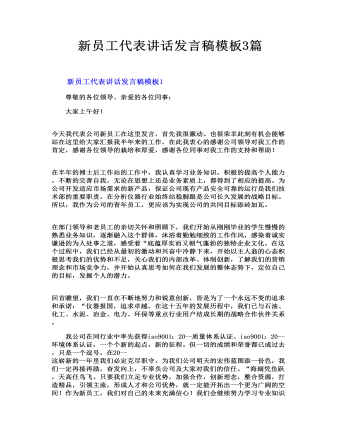
新员工代表讲话发言稿模板3篇
在部门领导和老员工的亲切关怀和照顾下,我们开始从刚刚毕业的学生慢慢的熟悉业务知识,逐渐融入这个群体,沐浴着勤勉细致的工作作风,感染着诚实谦逊的为人处事之道,感受着“底蕴厚实而又朝气蓬勃的独特企业文化。在这个过程中,我们已经从最初的激动和兴奋中冷静下来,开始以主人翁的心态积极思考我们的优势和不足,关心我们的内部改革、体制创新,了解我们的营销理念和市场竞争力,并开始认真思考如何在我们发展的整体态势下,定位自己的目标,发掘个人的潜力。
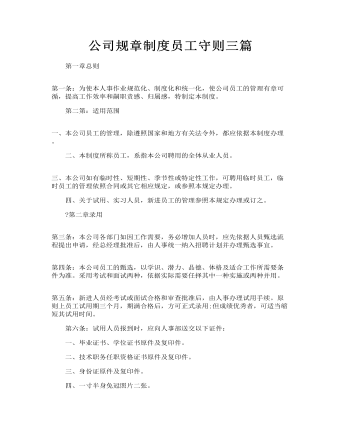
公司规章制度员工守则三篇
一、本公司员工的管理,除遵照国家和地方有关法令外,都应依据本制度办理。 二、本制度所称员工,系指本公司聘用的全体从业人员。 三、本公司如有临时性、短期性、季节性或特定性工作,可聘用临时员工,临时员工的管理依照合同或其它相应规定,或参照本规定办理。 四、关于试用、实习人员,新进员工的管理参照本规定办理或订之。
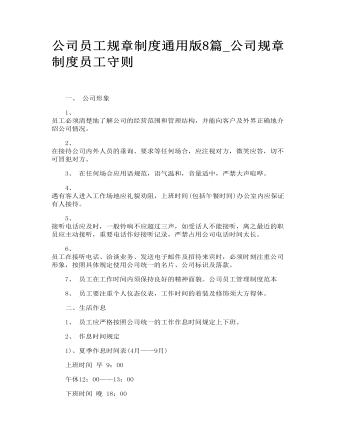
公司员工规章制度通用版8篇
1、 员工必须清楚地了解公司的经营范围和管理结构,并能向客户及外界正确地介绍公司情况。 2、 在接待公司内外人员的垂询、要求等任何场合,应注视对方,微笑应答,切不可冒犯对方。 3、 在任何场合应用语规范,语气温和,音量适中,严禁大声喧哗。
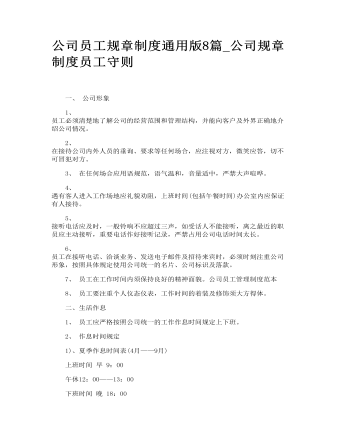
公司员工规章制度通用版8篇
1、 员工必须清楚地了解公司的经营范围和管理结构,并能向客户及外界正确地介绍公司情况。 2、 在接待公司内外人员的垂询、要求等任何场合,应注视对方,微笑应答,切不可冒犯对方。 3、 在任何场合应用语规范,语气温和,音量适中,严禁大声喧哗。
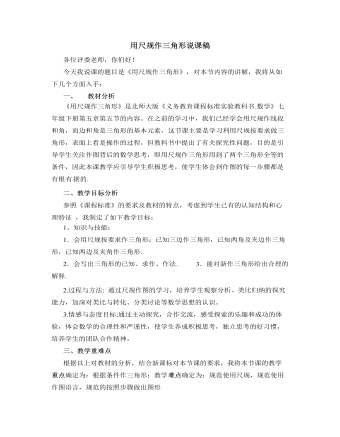
北师大版初中七年级数学下册用尺规作三角形说课稿
《用尺规作三角形》是北师大版《义务教育课程标准实验教科书.数学》七年级下册第五章第五节的内容。在之前的学习中,我们已经学会用尺规作线段和角,而边和角是三角形的基本元素,这节课主要是学习利用尺规按要求做三角形,表面上看是操作的过程,但教科书中提出了有关探究性问题,目的是引导学生关注作图背后的数学思考,即用尺规作三角形用到了两个三角形全等的条件,因此本课教学应引导学生积极思考,使学生体会到作图的每一步骤都是有根 有 据的.二、教学目标分析参照《课程标准》的要求及教材的特点,考虑到学生已有的认知结构和心理特征 ,我制定了如下教学目标:1、知识与技能:1.会用尺规按要求作三角形:已知三边作三角形,已知两角及夹边作三角形,已知两边及夹角作三角形.2.会写出三角形的已知、求作、作法. 3.能对新作三角形给出合理的解释.
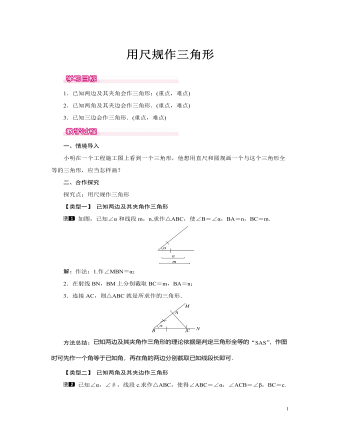
北师大初中七年级数学下册用尺规作三角形教案
【类型三】 已知三边作三角形已知三条线段a、b、c,用尺规作出△ABC,使BC=a,AC=b、AB=c.解:作法:1.作线段BC=a;2.以点C为圆心,以b为半径画弧,再以B为圆心,以c为半径画弧,两弧相交于点A;3.连接AC和AB,则△ABC即为所求作的三角形,如图所示.方法总结:已知三角形三边的长,根据全等三角形的判定“SSS”,知三角形的形状和大小也就确定了.作三角形相当于确定三角形三个顶点的位置.因此可先确定三角形的一条边(即两个顶点),再分别以这条边的两个端点为圆心,以已知线段长为半径画弧,两弧的交点即为另一个顶点.三、板书设计1.已知两边及其夹角作三角形2.已知两角及其夹边作三角形3.已知三边作三角形本节课学习了有关三角形的作图,主要包括两种基本作图:作一条线段等于已知线段,作一个角等于已知角.作图时,鼓励学生一边作图,一边用几何语言叙述作法,培养学生的动手能力、语言表达能力
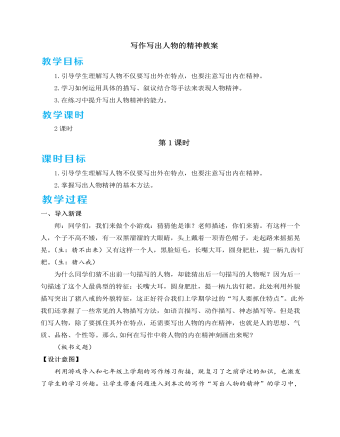
人教部编版七年级下册写作写出人物的精神教案
我来到书房,找到了字典,既想快点知晓答案,和妈妈比个胜负,又想慢点儿,万一又错了怎么办。我紧张地翻开字典,找到了“偌”字的读音。天呐,我是对的,我太开心了!(不足1:缺少动作描写,没有展现出“我”的紧张。修改:我使劲地捏着字典,颤抖着双手,慢慢地打开字典。不足2:结尾缺少人物的语言和神态描写,没有展现出人物开心的心理。修改:我眉飞色舞地大叫道:“天呐,我赢啦!我赢啦!”)我捧着字典,连蹦带跳地来到妈妈面前,欣喜若狂地说:“妈妈,你想不到吧,你一个堂堂初中老师,居然败在拼音不太好的女儿手下。哈哈,我终于报‘仇’了……”此时的我,简直比中了五百万还要开心一百倍。妈妈一听便傻了眼,刚才那坚定的神情已经荡然无存,妈妈连忙接过字典看了又看,生怕我看错了似的。看到字典上的读音,妈妈哑口无言。
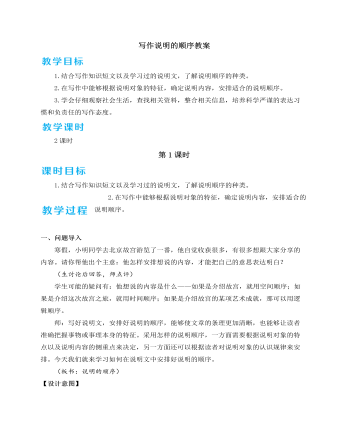
人教部编版语文八年级下册写作说明的顺序教案
片段三:大殿正中是一个约两米高的朱漆方台,上面安放着金漆雕龙宝座,背后是雕龙屏。方台两旁有六根高大的蟠龙金柱,每根大柱上盘绕着矫健的金龙。仰望殿顶,中央藻井有一条巨大的雕金蟠龙。从龙口里垂下一颗银白色大圆珠,周围环绕着六颗小珠,龙头、宝珠正对着下面的宝座。梁枋间彩画绚丽,有双龙戏珠、单龙翔舞,有行龙、升龙、降龙,多态多姿,龙身周围还衬托着流云火焰。——黄传惕《故宫博物院》 (1)找出三个片段中关于说明顺序的标志性词语。预设 片段一:立春过后、再过两个月、不久、于是转入、到了秋天、准备迎接。片段二:首先、此外、还可以、也可以。片段三:正中、上面、背后、两旁、殿顶、中央、周围、下面、周围。(2)学生归纳结论。预设 正确使用标志性的词语,能使对说明对象及内容的介绍更清楚。(3)小组讨论:以时间、空间或逻辑为序的说明语段,通常使用哪些标志性的词语?预设 时间顺序的说明语段一般要运用表示时间或先后的标志性词语;空间顺序的说明语段要运用表示方位的词语,如“东、西、南、北、里、外、左、右”等;逻辑顺序的说明语段可使用“首先”“其次”“再次”等表示由主到次的词语。



